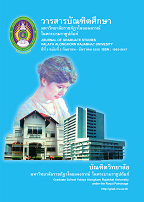รูปแบบการบริหารแบบมีส่วนร่วมของคณะกรรมการสถานศึกษาขั้นพื้นฐานขนาดเล็ก
Main Article Content
บทคัดย่อ
การวิจัยครั้งนี้มีวัตถุประสงค์ทั่วไปเพื่อเสนอรูปแบบการบริหารแบบมีส่วนร่วมของคณะกรรมการสถานศึกษาขั้นพื้นฐานขนาดเล็กและมีวัตถุประสงค์เฉพาะเพื่อ 1) ศึกษาสภาพปัจจุบัน ปัญหา และแนวทางการบริหารแบบมีส่วนร่วม 2) สร้างรูปแบบการบริหารแบบมีส่วนร่วมและ 3) นำเสนอรูปแบบการบริหารแบบมีส่วนร่วมเพื่อตรวจสอบรูปแบบ การดำเนินการวิจัยมี 3 ขั้นตอน ขั้นตอนที่ 1 ศึกษาสภาพปัจจุบันปัญหา และแนวทางการบริหารแบบมีส่วนร่วม กลุ่มตัวอย่างคือ คณะกรรมการสถานศึกษาขั้นพื้นฐานขนาดเล็ก ผู้บริหารและครูจาก 300 โรงเรียน จำนวน 2,700 คน ส่วนเครื่องมือที่ใช้ในการเก็บรวบรวม คือ แบบสำรวจ แบบสัมภาษณ์เชิงลึก แบบสังเกต และการจัดสนทนากลุ่ม เพื่อรวบรวมสภาพปัจจุบันปัญหา และแนวทางการบริหารแบบมีส่วนร่วมจากโรงเรียนต้นแบบ 4 แห่ง ขั้นตอนที่ 2 สร้างและประเมินองค์ประกอบของรูปแบบเบื้องต้น โดยใช้ผู้เชี่ยวชาญจำนวน 9 คน เครื่องมือที่ใช้ คือ แบบประเมินความเหมาะสมและความเป็นไปได้ ขั้นตอนที่ 3 นำเสนอรูปแบบการบริหารแบบมีส่วน โดยผู้เชี่ยวชาญ จำนวน 25 ท่าน ด้วยการจัดสัมมนาอิงผู้เชี่ยวชาญเพื่อประเมินรูปแบบและคู่มือการดำเนินการตามรูปแบบ เครื่องมือที่ใช้ คือ แบบประเมินความเหมาะสม ความเป็นไปได้และความเป็นประโยชน์ การวิเคราะห์ข้อมูลในการวิจัยครั้งนี้ ใช้สถิติเชิงบรรยายและวิธีการวิเคราะห์เนื้อหา
ผลการวิจัยพบว่า
1. ผลการศึกษาสภาพปัจจุบันของการบริหารแบบมีส่วนร่วม พบว่า การบริหารแบบมีส่วนร่วมในภาพรวมอยู่ในระดับมาก ส่วนสภาพปัญหาการบริหารแบบมีส่วนร่วมพบว่า สภาพปัญหาของการบริหารแบบมีส่วนร่วมที่ได้รับความร่วมมือน้อยคือ การวิจัย เพื่อพัฒนาคุณภาพการศึกษา การบริหารงานพัสดุและทรัพย์สิน การออกจากราชการของข้าราชการครูและบุคลากรทางการศึกษา และการบริหารงานธุรการ สำหรับแนวทางในการบริหารแบบมีส่วนร่วมของคณะกรรมการสถานศึกษาขั้นพื้นฐานขนาดเล็กนั้นพบว่า มีผู้ให้ข้อเสนอแนะว่าควรใช้กระบวนการบริหารแบบมีส่วนร่วมในการวางแผน รับผิดชอบการกระจายอำนาจ ทำงานเป็นทีมและประชาสัมพันธ์มากที่สุดใน 4 องค์ประกอบหลัก และใน 43 องค์ประกอบย่อย ตามตัวบ่งชี้ 80 ตัว
2. ผลการสร้างรูปแบบการบริหารแบบมีส่วนร่วมของคณะกรรมการสถานศึกษาขั้นพื้นฐานขนาดเล็ก ได้ องค์ประกอบหลัก 6 องค์ประกอบ ได้แก่ หลักการ วัตถุประสงค์ กลไกการดำเนินการ วิธีการดำเนินการ การประเมินผล และเงื่อนไขความสำเร็จ เพื่อให้สถานศึกษาขนาดเล็กนำไปใช้ โดยการกำหนดบทบาทหน้าที่ในองค์กร โดยยึดหลักการบริหารแบบมีส่วนร่วม 5 หลักการใน 4 องค์ประกอบหลัก ใน 43 องค์ประกอบย่อย และในตัวบ่งชี้ 80 ตัวใน 4 งาน ดังนี้ งานวิชาการ งานงบประมาณ งานบุคคลและงานบริหารทั่วไป โดยร่วมมือในด้าน 1) การมีส่วนร่วมวางแผน 2) การมีส่วนร่วมรับผิดชอบ 3) การมีส่วนร่วมการกระจายอำนาจ 4) การมีส่วนร่วมทำงานเป็นทีม และ 5) การมีส่วนร่วมประสาน/ประชาสัมพันธ์
3. ผลการนำเสนอรูปแบบการบริหารแบบมีส่วนร่วมของคณะกรรมการขั้นพื้นฐานขนาดเล็กพบว่า องค์ประกอบของรูปแบบซึ่งประกอบด้วย หลักการ วัตถุประสงค์ กลไกการดำเนินการ วิธีการดำเนินการ การประเมินผลและเงื่อนไขความสำเร็จ โดยรวมและรายด้าน ด้านความเหมาะสม ความเป็นไปได้และประโยชน์ อยู่ในระดับมากที่สุดทุกองค์ประกอบ
The general purpose of this research was to develop the participatory administration model of the basic education committee of small-sized schools focusing on 1) investigating the current conditions and problems of and the means for the participatory administration of the basic education committee of small-sized schools, 2) constructing the model, and3) proposing the constructed model for examination. The research was conducted in 3 phases. Phase 1: Investigating the current conditions and problems of and the means for the participatory administration was done through 2,700 committee, administrators, and teachers from 300 schools. The research tools consisted of a questionnaire, an in-depth interview, observation, and a focus-group interview. Phase 2: Constructing the model was done by the researcher and the model’s initial assessment of its suitability and possibility was operated by 9 experts. Phase 3: Proposing the model constructed for examination of the model’s suitability, possibility, and utility was conducted by 25 experts through a seminar. Data analysis was done through descriptive statistics and content analysis.
The research findings were as follows:
1. The current conditions of the participatory administration of the basic education committee of small-sized schools were found to be overall at a higher level. The problems revealed that the lowest level of participation of the following work: research for developing educational quality, management of materials and assets, resignation of teachers and personnel, and clerical management. The means for participatory administration from the respondents were gained. They suggested that the committee should have participated in the schools’ planning, responsibility, decentralization, teamwork, and public relations. The participation should have been found in four main components, 43 minor components following 80 indicators.
2. The model constructed consisted of 6 major components namely Principles, Objectives, Operational mechanisms, Operational processes, Evaluation, and Success conditions. These components were expected to be used by the small-sized schools by assigning roles and duties in the organizations on the bases of participatory administration principles as derived in 4 major components, in 43 minor components and in 80 indicators for the performances of academics, budget, personnel, and general administration. The participation was focused on 1) planning, 2) responsibility, decentralization, 4) teamwork, and 5) coordination/public relations.
3. The evaluation of the model constructed showed that the suitability, possibility, and utility of the major components namely Principles, Objectives, Operational mechanisms, Operational processes, Evaluation, and Success conditions were found to be overall and individual at the highest level.
Article Details

อนุญาตภายใต้เงื่อนไข Creative Commons Attribution-NonCommercial-NoDerivatives 4.0 International License.
บทความทุกเรื่องได้รับการตรวจความถูกต้องทางวิชาการโดยผู้ทรงคุณวุฒิ ทรรศนะและข้อคิดเห็นในบทความ Journal of Global of Perspectives in Humanities and Social Sciences (J-GPHSS) มิใช่เป็นทรรศนะและความคิดของผู้จัดทำจึงมิใช่ความรับผิดชอบของบัณฑิตวิทยาลัย มหาวิทยาลัยราชภัฏวไลยอลงกรณ์ ในพระบรมราชูปถัมภ์ กองบรรณาธิการไม่สงวนสิทธิ์การคัดลอก แต่ให้อ้างอิงแหล่งที่มา


